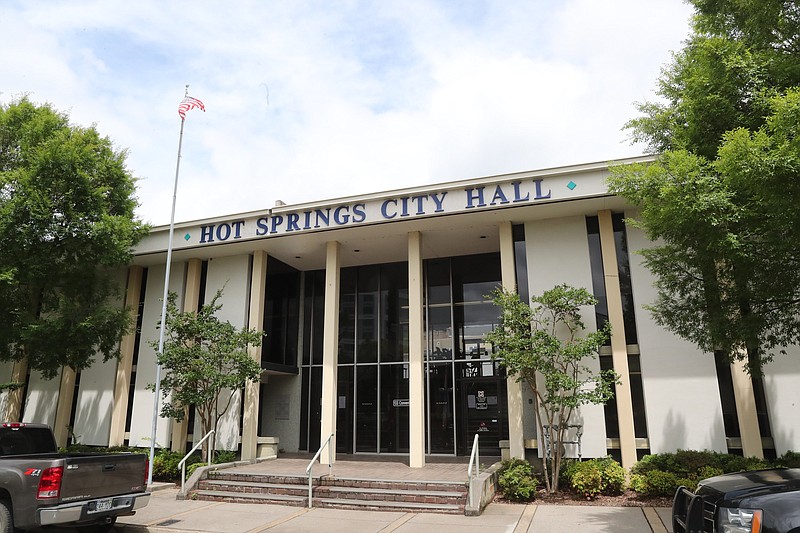Legislation limiting local regulation of vacation rentals threatens to undo the regulatory scheme the Hot Springs Board of Directors adopted in response to the proliferation of short-term rentals in the city.
The board has worked to balance the needs of STR owners with neighborhoods' concerns that renting single-family homes to vacationers has brought the area's tourism industry uncomfortably close to their front doors. The original ordinance adopted in spring 2021 has been amended numerous times in an effort to strike that balance.
"It's had to be massaged because issues come up and because of unintended consequences," Hot Springs Mayor Pat McCabe said Wednesday during his testimony to the state House's City, County and Local Affairs Committee. "We have a good solution that fits Hot Springs."
But Sen. Joshua Bryant, R-District 32, of Rogers, said the solution infringes on the rights of property owners. He told the committee his Senate Bill 197 would codify rights enshrined in the state Constitution. The bill passed the Senate on a 29-3 vote last month. The two senators representing Garland County, Alan Clark, R-District 7, of Lonsdale, and Matt McKee, R-District 6, of Pearcy, both voted for the bill.
The House committee said it plans to vote on SB197 at its March 27 meeting.
"Property rights are fundamental to all Arkansans," Bryant said at the start of the all-day hearing that included testimony from dozens of people. "I argue that when local control is attempting to subdue a constitutional right, we have a duty to debate this control and determine if this is the will of our state."
Bryant said a home is still a residence even when it's occupied by someone other than the owner.
"Has the use changed from residential to business or commercial?" Bryant told the committee. "If that is the case, every long-term rental should now be classified as a business and zoned accordingly. I argue the use has not changed regardless of duration. The property still functions a residential purpose.
" ... The essential nature of a dwelling does not change regardless of the duration of someone's head on a pillow."
Hot Springs City Attorney Brian Albright told the committee STRs have obligations similar to a business, such as collecting and remitting sales taxes and indemnifying their properties against liabilities not covered by a homeowner's insurance policy. He said the proceeds from the sale of an owner-occupied home can be excluded from taxable income, a deduction that's unavailable to homeowners who use their properties for business purposes.
"We can split hairs about whether residential use for pay is a commercial use or not, but it certainly is a business," he said.
The city has said its zoning code empowers it to regulate STRs, but Bryant argued that land use regulations shouldn't be used to limit STRs. He said authority the state delegated to cities to regulate noise, garbage, trespassing and disorderly conduct already give cities tools to manage nuisance STRs.
"I would say if your city, towns and municipalities don't currently have those ordinances, you need to be asking your mayor and city council to create them and enforce them," he told the committee. "That's the easiest and best deterrent to changing behavior, enforcing existing laws and rules."
The rise of STRs in other cities prompted them to adopt regulations similar to Hot Springs. Bella Vista City Council member Doug Fowler told the committee 495 STRs in his city are advertised on online marketplaces. The council adopted an ordinance capping the number at 600.
Like Hot Springs' governing body, Bella Vista's spent more than a year deliberating and refining its STR scheme.
"People in Bella Vista are paying attention to this bill," Fowler told the committee. "They're eagerly waiting to see where you place their standing in deference to a special interest group that's embedding small hotels and hostels into their streets and neighborhoods."
Eureka Springs prohibits STRs in areas zoned for residential use.
"The control needs to belong to the cities. and what's good for Eureka Springs may not work in other places," Eureka Springs Mayor Robert Berry told the committee. "Eureka Springs should be able to dictate how they control and what happens to the local community."
STR owners in Hot Springs have to certify their properties are in compliance with building and fire codes before they can apply for the permit required to obtain an STR business license. City Manager Bill Burrough told the committee local control ensures STRs have life safety measures such as secondary means of egress and smoke detectors that communicate with each other.
"These are all things that in an unregulated short-term rental could be life and death," he said. "Should someone die in an unregulated short-term rental, this legislation will have part of that cross to bear. The government closest to the people should make the decisions that impact them. Short-term rental regulations are tantamount to zoning, which is obviously a local issue."
